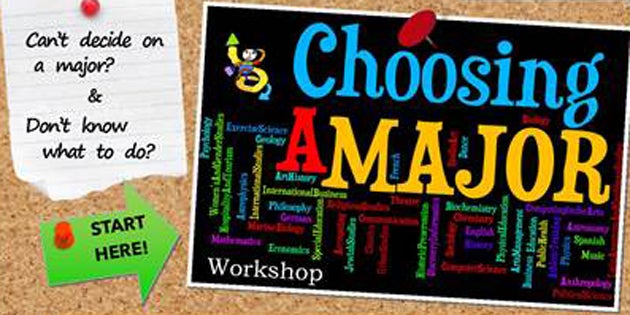Choosing a major in college is a big deal, but it is important to remember that it is a process, not a single event.
You’ll talk to people – like your academic advisor and parents – and you’ll attend events – like the Majors Fair on October 7, 2014 – before you decide. Then, even after you decide, you can always change your mind.
“While it is important to declare a major, it is even more important to make an informed decision about that major, so you’re putting yourself in a position to be academically successful,” notes Karen Hauschild, director of the Academic Advising and Planning Center at the College of Charleston.
1. Consider your strengths and weaknesses.
Figure out your strengths, weaknesses and goals.
RELATED: Take a self-assessment through the Career Center.
Talk to your academic advisor, career counselor, or a representative from the academic department to understand how a major connects to your strengths and goals.
2. Consider classes you’ve done well in.
Your first two years of college, you’ll take a lot of classes that fulfill general education requirements. Look more closely at the ones you in which got As and Bs – does one of those fields interest you?
“Go one step further,” advises Hauschild. “Don’t just choose a major because you liked the introductory course, consider taking an advanced course (and see how you do) before you completely commit and talk it over with your academic advisor.”
3. Consider what alumni say about the major.
Find alumni of your university and major through LinkedIn or ask for names of recent graduates from the academic department chair. Ask them about their experience and how their major relates to their current career. Ask if they could choose another major, what would it be?
RELATED: See possible careers in the I Want Your Job series.
4. Consider your “personal grit.”
In a major like athletic training, you’re going to give up a lot of free time for doctor’s clinics and team practices – even in college. If that isn’t appealing, maybe you should select a similar major (and in this case, career) with fewer commitments, like exercise science or physical education.
“Take the time to get to know yourself, be honest with yourself about what you’re willing to do and know your limitations, keeping in mind it is equally important knowing what you don’t want to do when selecting a major,” Hauschild says.
RELATED: See the “Major Roadmaps” so you know what you’re getting into.
5. Keep in mind your major is not necessarily your career.
Some majors – like computer science and accounting – do relate directly to careers in those fields. But, other majors prepare students with transferable skills that will help them in many fields.
“Math majors typically develop good analytical and problem-solving skills, while history majors develop good research skills,” explains Meredith Gerber, career counselor. “Employers want to know about your skills and experience – not necessarily how much you know about your major.”





